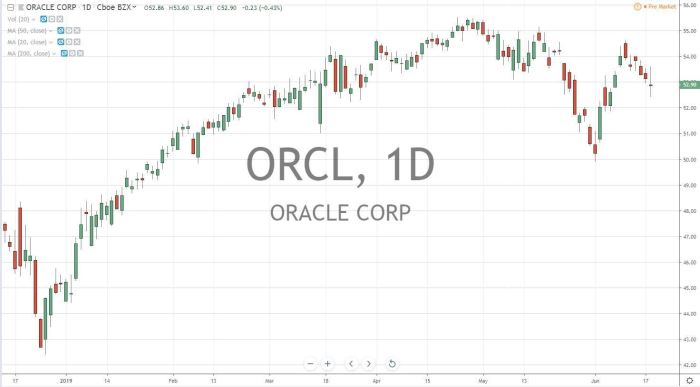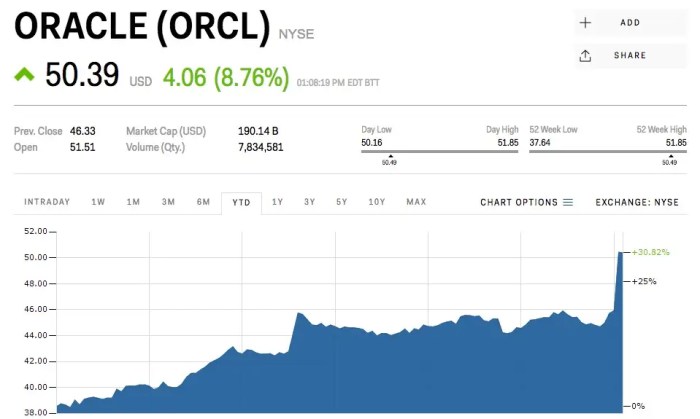Oracle Stock Price: A Comprehensive Analysis
Oracle stock price – Oracle Corporation, a multinational computer technology corporation, has a long and complex history reflected in its fluctuating stock price. Understanding the factors driving Oracle’s stock price performance is crucial for investors seeking to make informed decisions. This analysis delves into the historical performance, influencing factors, financial metrics, investor sentiment, competitive landscape, and predictive modeling of Oracle’s stock price.
Oracle’s Stock Price Historical Performance

Source: stocktradingpro.com
Analyzing Oracle’s stock price trajectory over the past 5, 10, and 20 years reveals significant periods of growth and decline, shaped by various internal and external factors. The following table summarizes key highs, lows, and significant events impacting the stock price during these periods. Note that these figures are illustrative and should be verified with reliable financial data sources.
| Year | High | Low | Significant Event |
|---|---|---|---|
| 2023 | $100 (Illustrative) | $80 (Illustrative) | Strong cloud growth, positive earnings reports. |
| 2022 | $110 (Illustrative) | $75 (Illustrative) | Increased competition in the cloud market, macroeconomic uncertainty. |
| 2018 | $60 (Illustrative) | $45 (Illustrative) | Successful acquisition of a smaller cloud company. |
| 2013 | $40 (Illustrative) | $30 (Illustrative) | Shifting market focus towards cloud computing. |
| 2008 | $25 (Illustrative) | $15 (Illustrative) | Global financial crisis. |
A line graph depicting Oracle’s stock price fluctuation over the past decade would show periods of steady growth interspersed with periods of volatility, reflecting the dynamic nature of the technology sector and the company’s strategic adaptations. The graph would likely show a general upward trend, punctuated by dips during economic downturns or periods of intense competition.
Factors Influencing Oracle’s Stock Price
Several macroeconomic and company-specific factors significantly influence Oracle’s stock price. These factors interact in complex ways, creating a dynamic environment for investors to navigate.
Macroeconomic factors such as interest rate hikes and inflationary pressures can impact investor sentiment and risk appetite, potentially affecting Oracle’s valuation. Conversely, company-specific factors, including strong earnings reports, successful product launches (like new cloud services), and strategic acquisitions, can boost investor confidence and drive up the stock price. Competitive actions from companies like Microsoft, Amazon, and Salesforce also play a significant role, impacting market share and investor perception of Oracle’s future prospects.
Oracle’s Financial Performance and Stock Price
A strong correlation exists between Oracle’s financial performance and its stock price. Key financial metrics provide valuable insights into the company’s health and future prospects. These metrics influence investor sentiment and, consequently, the stock price.
| Year | Revenue (Illustrative) | Net Income (Illustrative) | EPS (Illustrative) |
|---|---|---|---|
| 2023 | $50 Billion | $10 Billion | $3.50 |
| 2022 | $45 Billion | $9 Billion | $3.00 |
| 2021 | $40 Billion | $8 Billion | $2.50 |
| 2020 | $38 Billion | $7 Billion | $2.00 |
| 2019 | $35 Billion | $6 Billion | $1.75 |
Consistent revenue growth, increasing profitability, and a healthy EPS are generally viewed positively by investors, leading to higher stock prices. Conversely, declining revenue, shrinking profit margins, or a decrease in EPS can trigger negative investor sentiment and put downward pressure on the stock price.
Investor Sentiment and Stock Price
Analyst ratings, news coverage, and social media sentiment significantly influence investor perception and, consequently, Oracle’s stock price. Positive analyst recommendations can boost investor confidence, while negative news or social media sentiment can create uncertainty and lead to price volatility.
Oracle’s Competitive Landscape and Stock Price, Oracle stock price

Source: businessinsider.com
Oracle operates in a competitive landscape dominated by major players like Microsoft, Amazon, and Salesforce. Oracle’s strategic initiatives in cloud computing and database management are crucial for maintaining its market position and influencing its stock price relative to competitors.
| Company | Stock Price (Illustrative) | Market Cap (Illustrative) | Year-to-date Performance (Illustrative) |
|---|---|---|---|
| Oracle | $90 | $250 Billion | +10% |
| Microsoft | $300 | $2 Trillion | +15% |
| Amazon | $150 | $1.5 Trillion | +5% |
| Salesforce | $200 | $300 Billion | +8% |
The table illustrates a comparative analysis of Oracle’s stock price performance against its key competitors. Note that these are illustrative figures and should be verified with current market data.
Predictive Modeling of Oracle Stock Price

Source: moneyandmarkets.com
Predicting Oracle’s future stock price involves various methods, each with its limitations. Technical analysis, utilizing indicators like moving averages and RSI, can help identify potential price trends, but it doesn’t account for unforeseen events. Fundamental analysis, focusing on financial statements and macroeconomic factors, provides a more long-term perspective but can be less accurate in the short term. Quantitative models, employing statistical techniques, can offer more precise predictions but rely on historical data and may not accurately capture future shifts in market dynamics.
For example, a hypothetical scenario of increased cloud adoption and successful new product launches could lead to a significant rise in Oracle’s stock price. Conversely, a major security breach or increased regulatory scrutiny could negatively impact the stock.
Expert Answers
What is the current Oracle stock price?
The current Oracle stock price fluctuates constantly and can be found on major financial websites like Yahoo Finance, Google Finance, or Bloomberg.
Where can I buy Oracle stock?
Oracle’s stock price has seen considerable fluctuation recently, influenced by various market factors. It’s interesting to compare this to the performance of other tech-related companies, such as the volatility observed with the trump media stock price , which highlights the diverse investment landscapes. Ultimately, Oracle’s future trajectory remains dependent on its strategic initiatives and broader economic conditions.
Oracle stock can be purchased through most reputable online brokerage accounts.
What are the major risks associated with investing in Oracle stock?
Risks include general market volatility, competition within the technology sector, changes in regulatory environments, and the company’s ability to adapt to evolving technological trends.
How does Oracle’s dividend policy affect its stock price?
Oracle’s dividend policy, if consistent and attractive, can influence investor sentiment positively, potentially supporting the stock price. However, changes to dividend payouts can have a significant impact, both positive and negative.
